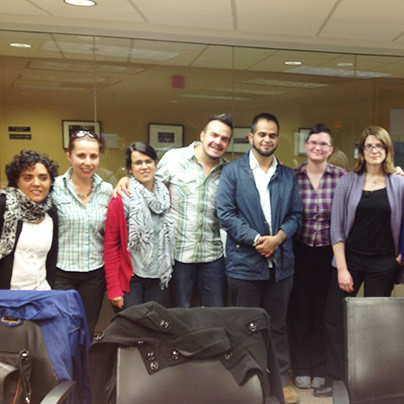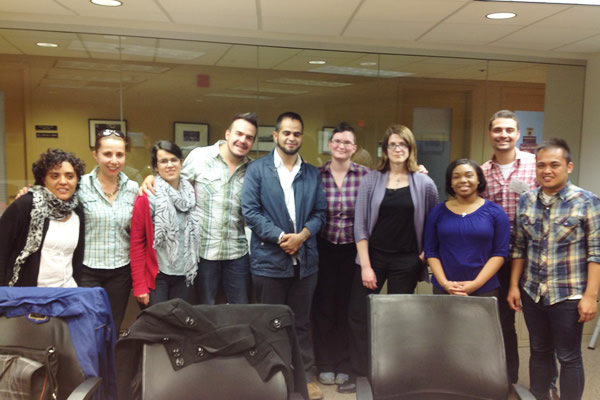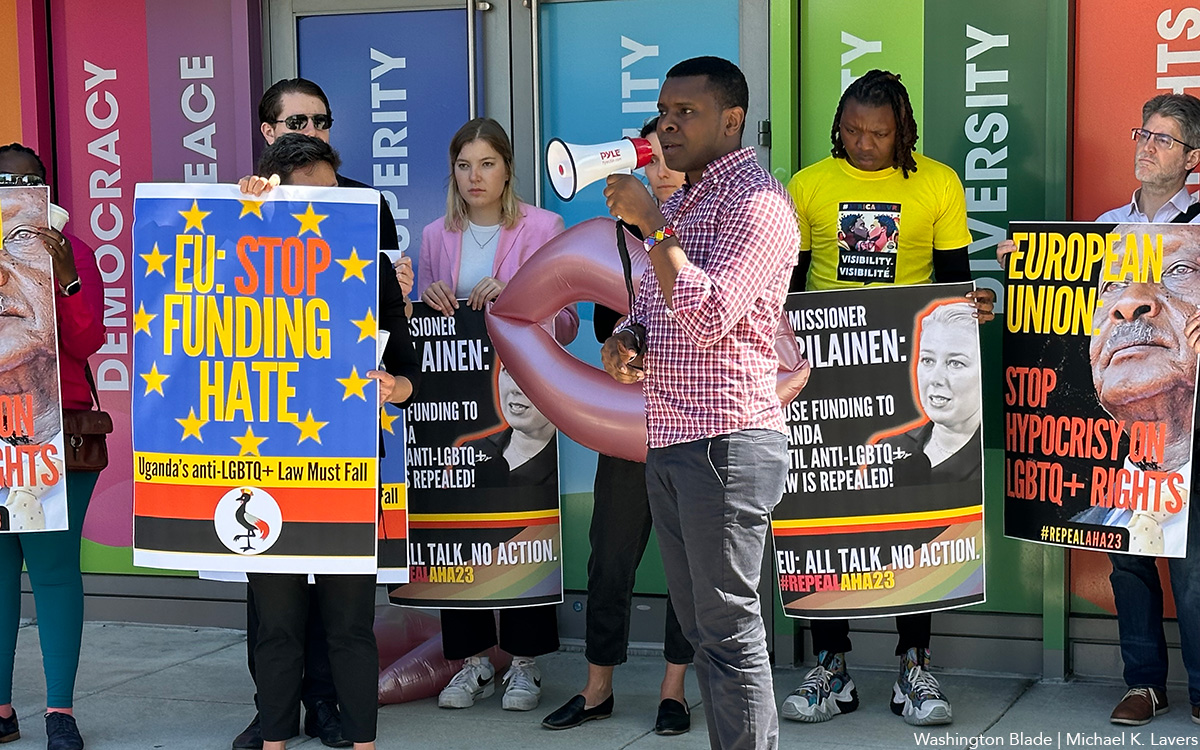World
Colombian LGBT rights advocates visit U.S.
Six activists took part in State Department-sponsored trip


Colombian LGBT rights advocates are in the U.S. on a State Department-sponsored trip. (Photo courtesy of Wilson Castańeda)
Six Colombian LGBT rights advocates have visited D.C. and two other states this month as part of a State Department-sponsored trip to learn how activists, politicians and government officials in this country advance civil and human rights.
The group — which includes lawyer Viviana Baharquez Monsalve; Wilson de Jesús Castañeda Castro, director of Corporación Caribe Afirmativo in Cartagena; Juan Carlos Pietro García, director of the city of Bogotá’s Office of Sexual Diversity and Federico Ruíz Mora of the Santamaría Fundación in Cali — arrived in D.C. on April 14.
The advocates met with State Department officials, Lisa Mottet of the National Gay and Lesbian Task Force, Human Rights Campaign and Victory Fund staffers, transgender activists and others while in the nation’s capital. They will have also traveled to Des Moines, Iowa, and San Diego before returning to Colombia on Wednesday.
Castañeda, whose group advocates on behalf of LGBT Colombians who live along the country’s Caribbean coastline, told the Washington Blade during an April 18 interview that he and his fellow activists highlighted their work on behalf of their gay, lesbian, bisexual and trans countrymen. He said they also wanted to learn about this country’s elections, documentation of hate crimes and anti-bullying efforts in schools while in the United States.
Ruíz, whose group advocates on behalf of trans women, discussed how the Colombian LGBT rights movement compares to that in the United States.
“Things are rather similar to those in our country, but there are clearly obvious differences,” he said.
The activists arrived in the United States less than a month after the U.S. Supreme Court heard oral arguments in two cases that challenge the constitutionality of California’s Proposition 8 and the Defense of Marriage Act. Their trip also coincided with the ongoing debate over a bill that would extend marriage rights to same-sex couples in Colombia.
The Colombian Senate had been scheduled to vote on the proposal on April 18 — the same day the activists spoke with the Blade, but it was postponed until Tuesday. Baharquez said it will prove “very, very difficult” to pass the same-sex marriage bill because of opposition from religious conservatives in the country’s Congress.
“There is little hope that something is going to pass,” she said.
Colombian senators in 2007 defeated a bill that would have allowed gays and lesbians to enter into civil unions.
The country’s Constitutional Court in three separate rulings it issued later that year and in 2008 extended property and inheritance rights, social security and pension benefits to same-sex couples. The tribunal in 2009 issued a ruling that said co-habitating gay and lesbian couples must receive the same rights that unmarried heterosexual couples receive under Colombian law.
The same court in 2011 ruled lawmakers must pass legislation within two years that extends the same benefits that heterosexuals receive through marriage to same-sex couples. If legislators fail to act on this mandate by June 20, gays and lesbians can legally register their unions.
Anti-trans violence remains endemic in Colombia
While attention remains focused on extending marriage rights to same-sex couples, violence against trans women remains rampant throughout the country.
A report from the Latin American and Caribbean Network of Transgender Women (REDLACTRANS) notes 61 trans women in Colombia have been reported murdered between 2005-2011. The group further notes none of the alleged perpetrators have been prosecuted — Ruíz said authorities often exacerbate the problem.
“Colombia is the same as many Latin American countries and others around the world; the trans community is that which is the most affected,” he said as he discussed the issue. “This has to do with historic discrimination and exclusion accompanied by systematic acts of violence. This violence has to do with transphobic acts because of [the victim’s] gender identity.”
The advocates hope to launch a campaign in support of a trans rights bill that would, among other things, “guarantee a dignified life for trans women in Colombia.” Ruíz further described them as those who are “in a helpless situation against the constant violation of their human rights.”
Argentine President Cristina Fernández de Kirchner in May 2012 signed a bill that allows people who have not undergone sex-reassignment surgery to legally change their gender without a doctor or judge’s approval. The law further mandates public and private health insurance plans to cover SRS, hormone therapy and other trans-specific treatments without additional premiums.
Castañeda told the Blade the campaign through which Argentine LGBT rights advocates secured passage of their country’s trans rights bill is “important to us.” He stressed, however, their own effort should take into account the “particularity of the situation” that trans Colombians currently face with regard to discrimination and violence.
Ruíz also responded to the Blade’s question about whether the ongoing same-sex marriage debate has overshadowed the need to extend legal protections based on gender identity and expression.
“It is an advance in the recognition of rights as a group,” he said, while noting some trans women don’t identify much with the issue of nuptials for gays and lesbians. “For the trans organizations, it will be much more important that gender identity is recognized as an identify for the purposes of rights.”
In addition to efforts in support of same-sex marriage and trans rights, the advocates said they will continue to seek LGBT inclusion in the ongoing peace profess between the Colombian government and armed rebels. They also hope to have a greater presence in the country’s political system.
The U.S. Agency for International Development earlier this month announced a public-private partnership designed to promote LGBT rights around the world. The Victory Institute and the Astraea Foundation will conduct the initiative’s first training in Bogotá, the Colombian capital, from May 30-June 2.
Bogotá City Councilor Angelica Lozano; Blanca Durán, mayor of the Colombian capital’s Chapinero district and Tatiana Piñeros, a trans woman whom Bogotá Mayor Gustavo Petro appointed last year to run the city’s social welfare agency are among those expected to attend.
“For those of us who have come to the United States, we identified and built upon best practices to know and use in our daily work,” Prieto said.
European Union
Activists demand EU sanction Uganda over Anti-Homosexuality Act
Yoweri Museveni signed law on May 29, 2023

More than a dozen activists who protested in front of the European Union Delegation to the United States in D.C. on Thursday demanded the EU to sanction Uganda over the country’s Anti-Homosexuality Act.
Hillary Innocent Taylor Seguya, a Ugandan LGBTQ activist, and Global Black Gay Men Connect Executive Director Micheal Ighodaro are among those who spoke at the protest. Health GAP Executive Director Asia Russell also participated in the event that her organization organized along with GBGMC and Convening for Equality Uganda, a Ugandan LGBTQ rights group.
Ugandan President Yoweri Museveni last May signed the Anti-Homosexuality Act that, among other things, contains a death penalty provision for “aggravated homosexuality.”
The country’s Constitutional Court on April 3 refused to “nullify the Anti-Homosexuality Act in its totality.” A group of Ugandan LGBTQ activists have appealed the ruling.
A press release that Health GAP issued ahead of Thursday’s protest notes EU Commissioner for International Partnerships Jutta Urpilainen on March 6 announced more than €200 million ($212.87 million) for Uganda in support of “small business owners, young female entrepreneurs, agribusinesses as well as vital digital infrastructure projects in full Team Europe format with the European Investment Bank (EIB) and several member states.”
“These concrete initiatives will make a difference to aspiring entrepreneurs, Ugandan businesses and create jobs in multiple sectors,” said Urpilainen in a press release that announced the funds. “This is a perfect example of how Global Gateway can make a tangible difference for citizens and businesses and unlock the full potential of a partner country by working together.”
Convening for Equality Uganda on Tuesday in a letter they sent to Urpilainen asked the EU to review all funding to Uganda and “pause or reprogram any funds that go via government entities.” The protesters on Thursday also demanded European Commission President Ursula von der Leyen “to hold Ugandan President Museveni’s government accountable for this attack on human rights.”
Josep Borrell, the EU’s top diplomat, in a statement he released after Museveni signed the Anti-Homosexuality Act said the law “is contrary to international human rights law and to Uganda’s obligations under the African Charter on Human and People’s Rights, including commitments on dignity and nondiscrimination, and the prohibition of cruel, inhuman or degrading punishment.”
“The Ugandan government has an obligation to protect all of its citizens and uphold their basic rights,” said Borrell. “Failure to do so will undermine relationships with international partners.”
“The European Union will continue to engage with the Ugandan authorities and civil society to ensure that all individuals, regardless of their sexual orientation and gender identity, are treated equally, with dignity and respect,” he added.
Urpilainen last September in a letter to the European Parliament said the EU would not suspend aid to Uganda over the law.
India
Indian political parties for the first time include LGBTQ rights in election platforms
Voters will begin to cast ballots on April 19

The world’s largest democratic exercise will begin in India on April 19 as citizens begin to cast their votes in the country’s election.
This year’s election is different because national level political parties for the first time are promising to extend marriage rights to same-sex couples as part of their election platforms.
The Indian National Congress, one of India’s oldest political parties, promised after wide consultation that it would introduce a bill that would recognize civil unions between couples who are part of the LGBTQ community. The party, which has governed India for the majority of the period since independence from the U.K. in 1947, has refrained from taking a stance on laws that include Section 377, which criminalized consensual same-sex sexual relations.
Then-Health Minister Gulam Nabi Azad in 2011 when the INC was in power said homosexuality is a disease. He made the controversial comment while speaking at an HIV/AIDS conference in New Delhi, the Indian capital.
“Unfortunately, this disease has come to our country too,” said Azad. “Where a man has sex with another man, which is completely unnatural and should not happen but does.”
When the Delhi High Court was hearing the Naz Foundation case, the Home Affairs Ministry opposed the striking down of Section 377 based on its belief that homosexuality cannot be morally condoned. The INC never struck down Section 377, which criminalized homosexuality, in parliament.
A 5-judge panel on the Supreme Court on Sept. 6, 2018, decriminalized consensual same-sex sexual relations.
The Communist Party of India (Marxist) on April 4 unveiled its platform with a range of socialist commitments, including support for LGBTQ rights. Among these pledges is to amend the Transgender Persons (Protection of Rights) Act 2019 to address community concerns and ensure legal recognition and protection for same-sex couples akin to marriage.
The platform also outlined plans to introduce a bill similar to the Special Marriage Act of 1954, which allows partners to be listed as dependents and facilitating like inheritance, alimony in the event of divorce and other issues. The party further pledged to enact a comprehensive anti-discriminatory bill that would include LGBTQ people, ensure quotas in educational institutions and implement horizontal reservations in employment.
Addressing the issue of crimes against LGBTQ people, the platform promised to treat such offenses on par with crimes against heterosexuals. The platform also calls for tackling bullying, violence and harassment of gender non-conforming and LGBTQ people in educational settings, enforcing anti-hazing policies and combating hazing based on sexual orientation and gender identity.
The platform further touched issues related to transition and informed consent.
The Special Marriage Act of 1954 is a law that provides for civil unions among Indians and Indian nationals who live abroad, regardless of the religion or faith followed by either party. This law enables people from two different religious backgrounds to enter into marriage. Parliament in 2019 passed the Transgender Persons (Protection of Rights) Act that extended rights to trans people.
Brinda Karat, a former member of the Rajya Sabha, the upper house of the Indian Parliament, and leader of the Communist Party of India (Marxist), spoke with the Washington Blade and said the current government has homophobic ideas that are not acceptable to the party.
The ruling government under Prime Minister Narendra Modi is striving to secure more than 400 parliament seats in the upcoming election, aiming for a substantial majority.
Various polls conducted by Indian news organizations indicate a probable victory for the ruling Bharatiya Janata Party. In response to the BJP’s dominance, Congress and several national and regional parties have joined forces as the Indian National Developmental Inclusive Alliance.
This alliance comprises 26 opposition political parties. Despite its formation, however, there is no clear coalition strategy in place and only two parties have included LGBTQ-specific policies in their election platforms.
The Blade reached out to Congress’ spokesperson for comment, but has not received a response. The BJP also did not respond to a request for comment.
The party has yet to release its election platform.
Ankush Kumar is a reporter who has covered many stories for Washington and Los Angeles Blades from Iran, India and Singapore. He recently reported for the Daily Beast. He can be reached at [email protected]. He is on Twitter at @mohitkopinion.
Africa
Ugandan activists appeal ruling that upheld Anti-Homosexuality Act
Country’s Constitutional Court refused to ‘nullify’ law

Twenty-two LGBTQ activists in Uganda have appealed this month’s ruling that upheld the country’s Anti-Homosexuality Act.
The Constitutional Court on April 3 refused to “nullify the Anti-Homosexuality Act in its totality.”
President Yoweri Museveni last May signed the law, which contains a death penalty provision for “aggravated homosexuality.”
The U.S. subsequently imposed visa restrictions on Ugandan officials and removed the country from a program that allows sub-Saharan African countries to trade duty-free with the U.S. The World Bank Group also announced the suspension of new loans to Uganda.
Media reports indicate Sexual Minorities Uganda Executive Director Frank Mugisha and Jacqueline Kasha Nabagesara are among the activists who filed the appeal.
-

 Africa5 days ago
Africa5 days agoCongolese lawmaker introduces anti-homosexuality bill
-

 District of Columbia2 days ago
District of Columbia2 days agoReenactment of first gay rights picket at White House draws interest of tourists
-

 District of Columbia1 day ago
District of Columbia1 day agoNew D.C. LGBTQ+ bar Crush set to open April 19
-

 World5 days ago
World5 days agoOut in the World: LGBTQ news from Europe and Asia











